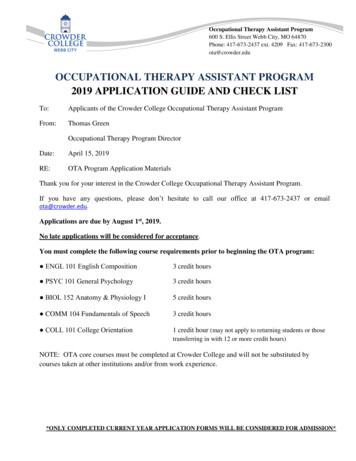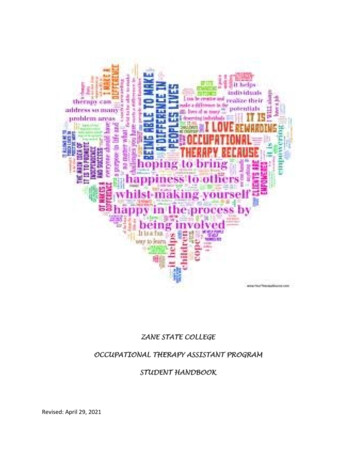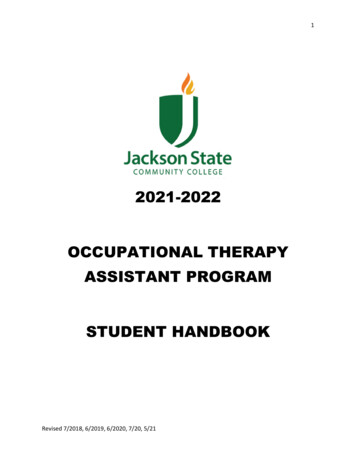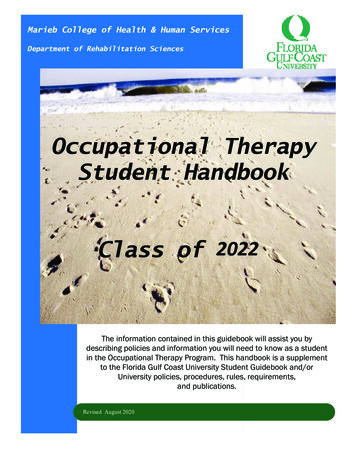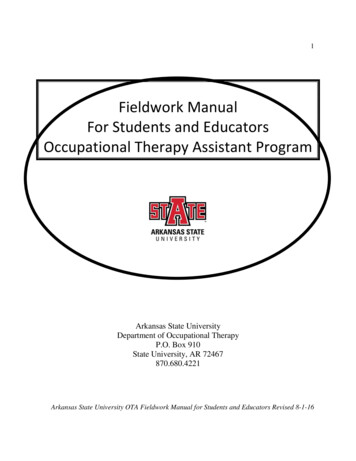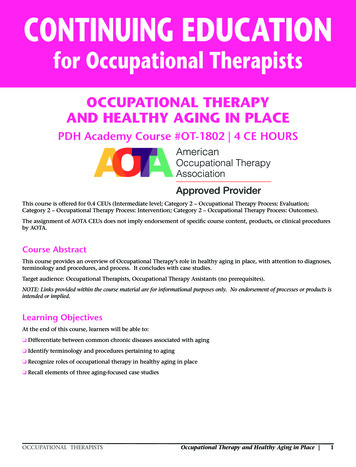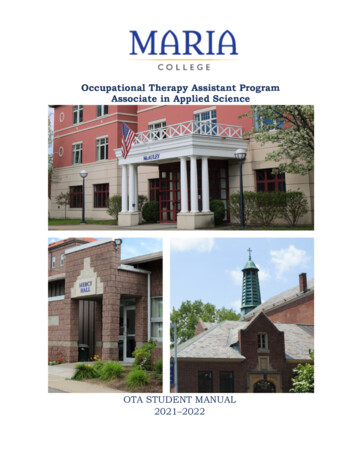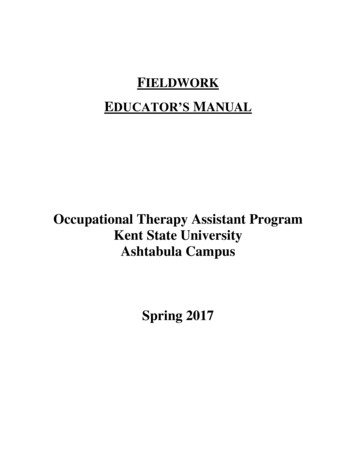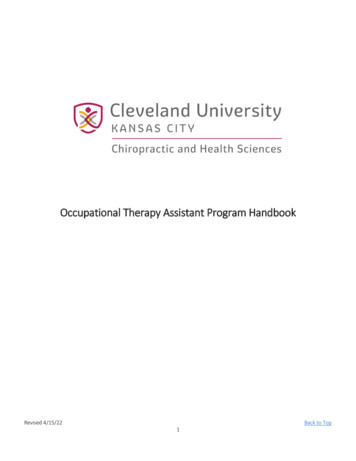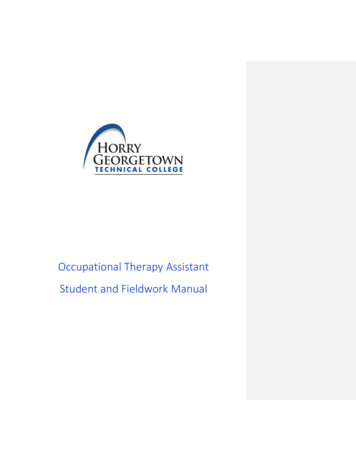
Transcription
Occupational Therapy AssistantStudent and Fieldwork Manual
Prospective & Current OTA StudentsWe are delighted that you are considering a career as an Occupational Therapy Assistant. We hope you will enjoy this chapterin your educational experience as you learn more about one of the most exciting areas of the human services professions.This student and clinic handbook has been created to help you navigate the program and answer many of the questions youmay have. You may also check the web site at http://www.hgtc.edu or contact either the program director or academicfieldwork coordinator.Welcome to the Occupational Therapy Assistant Program!Gina Brown, MOT, OTR/L, CLT, WCC, ATC, PTADirector, Occupational Therapy Assistant ProgramE-mail: regina.brown@hgtc.eduOffice Phone: 843-839-1092Robert E. Speir, Jr. Healthcare Education Building 1000, Office 1282MKatie Sims, BS, COTA/LAcademic Fieldwork Coordinator, Occupational Therapy Assistant ProgramE-mail: katie.sims@hgtc.eduOffice Phone: 843-839-1034Robert E. Speir, Jr. Healthcare Education Building, 1000, Office 1282P
Table of ContentsAddress: . 1Statement of Equal Opportunity/Non-Discrimination . 1Occupational Therapy Assistant Degree. 1ACOTE Accreditation & Status . 1Essential Skills Requirements for Occupational Therapy Practice. 1OTA Licensure Requirements: . 2Notification of Disclosure Re: Felony Convictions, Substance Abuse & Malpractice: . 2Career Opportunities for OTA’s: . 3OTA Program Admission: . 3Horry Georgetown Technical College Mission Statement:. 3Horry Georgetown Technical College Philosophy: . 3Program Mission Statement: . 4Program Philosophy: . 4Program Goals: . 4Program Learning Outcomes: . 4Program Curriculum Design:. 5Acceptance, Matriculation, Graduation, Board Exam Pass Rates, & Employment Rates: . 5Program Policy 1Title: Technical Standards, Essential Eligibility and Essential Requirements of the Program . 6Program Policy 2Title: Occupational Therapy Code of Ethics . 8Program Policy 3Title: Student Privacy and Confidentiality . 14Program Policy 4Title: Informed Consent . 15Program Policy 5Title: Class, Laboratory and Fieldwork Attendance . 16Program Policy 6Title: Electronic Devices . 18Program Policy 7Title: Dress Standards for Classroom, Laboratory and Clinic . 19Program Policy 8Title: Grading Policy . 20Program Policy 9Title: Makeup Assignments. 21Program Policy 10Title: Program Progression . 22
Student Policy 11Title: Student Competence Prior to Fieldwork . 25Program Policy 12Title: Academic Alert . 26Student Policy 13Title: Academic Probation. 27Student Policy 14Title: Student Academic Misconduct . 28Program Policy 15Title: Student Withdrawal . 29Program Policy 16Title: Program Dismissal 30Program Policy 17Title: Due Process 31Program Policy 18Title: Occupational Therapist or Occupational Therapy Assistant Transfer Student .32Program Policy 19Title: Program Re-Application Policy .33Program Policy 20Title: Program Re-Entry Policy .34Program Policy 21Title: Campus Safety and Emergency Procedures 35Program Policy 22Title: Health Services . 36Program Policy 23Title: Student Blood and/or Body Fluid Exposure Follow-Up or Chemical Exposure . 37Program Policy 24Title: Laboratory Regulations for Safety and Order . 38Program Policy 25Title: Safety in Student Interactions in the Classroom, Laboratory, and Fieldwork Settings . 40Program Policy 26Title: Safety of Students When in the Role of Subjects or Patient-Simulators . 41Student Policy 27Title: Ensuring Program Laboratory Equipment is Safe, Appropriately Maintained and Calibrated . 42Student Policy 28Title: Accidents or Illnesses Occurring On or Off Campus . 43Student Policy 29Title: Off Campus Laboratories and Field Trips . 44Student Policy 30Title: Drug Testing at Clinical Site . 45Program Policy 31Title: Health and Professional Liability Insurance Requirements for Clinical Education . 46
Program Policy 32Title: Student Clinical Education Travel . 47Student Policy 33Title: Off-Campus Fieldwork Education . 48Student Policy 34Title: Academic Fieldwork Coordinator and Fieldwork Educator Responsibilities . 49Program Policy 35Title: Fieldwork Educator Rights and Responsibilities . 52Program Policy 36Title: Clinical Site Contracts . 53Program Policy 37Title: Fieldwork Site Placement and Cancellation. 54Program Policy 38Title: Complaint Process for Non-Faculty and Non-Students . 55Program Policy 39Title: Fieldwork Educator Development Activities . 56Program Policy 40Title: Social Media . 57Student Policy 41Title: Student Communication with the Fieldwork Site . 58Student Policy 42Title: Professional References. 59Program Policy 43Title: ACOTE Notification Requirements . 60Program Policy 44Title: Sponsoring Institution Responsibilities. 61Program Policy 45Title: Academic Fieldwork Coordinator and Fieldwork Educator Responsibilities . 62
Address:Horry-Georgetown Technical CollegeGrand Strand Campus Building 1000Robert E. Speir Jr., Healthcare Education Building3501 Pampas DriveMyrtle Beach, SC 29577-5044Statement of Equal Opportunity/Non-DiscriminationStatement of Equal Opportunity/Non-DiscriminationHorry Georgetown Technical College does not discriminate on the basis of race, color, national origin, sex, disability, or agein its programs and activities. The following persons have been designated to address inquiries regarding the nondiscrimination policies: Employee and applicant inquiries concerning the federal laws and their application to the Collegemay be directed to the College’s Affirmative Action/Equal Opportunity Officer: Associate Vice President for HumanResources and Employee Relations, HGTC, PO Box 261966, Conway, SC 29528-6066, 843-349-5212, who serves as theCollege’s Section 504, Title II, and Title IX Coordinator. Student and prospective student inquiries concerning Section 504,Title II and Title IX and their application to the College or any student decision may be directed to Associate Vice Presidentfor Student Affairs, HGTC, PO Box 261966, Conway, SC 29528-6066, 843-349-5228.Occupational Therapy Assistant DegreeAssociate in Applied Science, with a major in Occupational Therapy Assistant (OTA)ACOTE Accreditation & StatusThe associate-degree-level occupational therapy assistant program has applied for accreditation and has been grantedCandidacy Status by the Accreditation Council for Occupational Therapy Education (ACOTE) of the American OccupationalTherapy Association (AOTA), located at 6116 Executive Boulevard, Suite 200, North Bethesda, MD 20852-4929. ACOTE’stelephone number c/o AOTA is (301) 652-AOTA and its web address is www.acoteonline.org. The program must have apreaccreditation review, complete an on-site evaluation, and be granted Accreditation Status before its graduates will beeligible to sit for the national certification examination for the occupational therapy assistant administered by the NationalBoard for Certification in Occupational Therapy (NBCOT). After successful completion of this exam, the individual will be aCertified Occupational Therapy Assistant (COTA). In addition, all states require licensure in order to practice; however, statelicenses are usually based on the results of the NBCOT Certification Examination. Note that a felony conviction may affect agraduate’s ability to sit for the NBCOT certification examination or attain state licensure.Essential Skills Requirements for Occupational Therapy PracticeListed below are essential skills that a student should possess in order to progress satisfactorily through the OccupationalTherapy Associate (OTA) curriculum. A prospective student with a disability that is concerned that the disability may impacthis or her ability to perform one or more of these skills, provide patient care, or participate in other job activities, isencouraged to contact the Office for Accessibility and Disabilities on the Conway campus by calling (843) 349-5249.Critical Thinking: The OTA student must possess critical thinking skills sufficient for clinical judgment. The student mustbe able to use the OT process as a basis for solving client problems, including identifying cause andeffect relationships in clinical situations, developing appropriate interventions, and safely andeffectively providing treatment.Interpersonal Skills: The OTA student should possess interpersonal and self-management skills sufficient to interact withindividuals, families and groups from a variety of social, emotional, cultural and intellectualbackgrounds. The student must be able to establish therapeutic relationships with patients, familiesand significant others.Communication: The OTA student should possess communication skills sufficient for interaction with clients, caregiversand other professionals in verbal and written form. The student must be able to effectively report and1
document clinical observations, provide client and caregiver instruction, gather data throughinterviewing, participate in team meetings and provide in-service presentations.Mobility: The OTA student should possess physical skills sufficient to maneuver throughout the facility and within smallspaces to provide effective intervention. The student must be able to move around in patient rooms,bathrooms and other workspaces to provide effective treatment implementation.Motor Skills: The OTA student should possess gross and fine motor skills sufficient to function as an OTA. The studentmust be able to use equipment, fabricate and use adapted devices, fabricate splints and utilize motoractivities in client treatment as required by the work site. The student must also be able to position,transfer and transport clients, provide physical assistance and demonstrate physical endurance adequatefor the workplace.Hearing: The OTA student should possess auditory skills sufficient to monitor and assess client needs. The student mustbe able to hear monitor alarms, emergency signals, auscultatory sounds (breath and heart sounds) and cries forhelp.Visual: The OTA student should possess visual skills sufficient for observation and assessment necessary in OTA practice.The student must be able to observe patient/client responses to treatment, see a change in skin color and readassessment instruments.Tactile: The OTA student should possess tactile skills sufficient for physical assessment. The student must be able toperform palpation, physical examination, such as manual muscle testing, and/or tactile functions related totherapeutic intervention.Emotional: The OTA student should possess emotional stability sufficient to maintain composure in stressful situations.The student must be able to interact appropriately with peers, clients and supervisors at all times, includingduring high stress, and to receive corrective feedback calmly.Environmental: The OTA student should be able to tolerate environmental stressors. The student must be able to adaptto variations in work schedule, work with clients who may have open wounds, or be soiled or unbathed,work with chemicals and materials required for OT practice, and work in areas that are close or crowded.OTA Licensure Requirements:All states, the District of Columbia, Puerto Rico, and Guam require occupational therapists and occupational therapyassistants to be licensed. Licensure is important because it demonstrates that you have met a minimum standard oftraining and experience to provide certain services. States have similar, but not identical requirements and procedures forobtaining a license. For specific state licensure requirements, always consult the state occupational therapy regulatoryagency.Notification of Disclosure Re: Felony Convictions, Substance Abuse & Malpractice:Applicants should know that the application to sit for the NBCOT certification exam includes character review questionsregarding felony convictions. Please refer to the NBCOT Certification Exam Handbook for additional information. SouthCarolina has no laws restricting how criminal record may be considered in the employment context, including any limits onapplication-stage inquiries. A conviction is not a bar to licensure unless it directly relates to the occupation, and a pardonremoves any such bars. Expunged records are available to law enforcement but otherwise only by court order. Refer toSouth Carolina Code of Laws, Section 40-36-110 (7). Applicants should know that most states have regulations regarding anapplicant’s eligibility to practice as an OTA. As part of the application process, states may request information regardinghistory of chemical and/or drug abuse, felony convictions and malpractice. Finally, applicants should know that passing abackground check is a prerequisite to being accepted as a student intern by a growing number of hospitals, schools, andinstitutions for field work clinical experiences. A felony conviction may seriously limit the availability of fieldworkopportunities while a student and may result in an inability to complete all requirements necessary for graduation.2
Career Opportunities for OTA’s:For more information about careers: visit O*Net Online for an overview of South Carolina and National earnings statisticsvisit HGTC’s Career Resource Center for more employment resources.American Occupational Therapy Association (AOTA): https://aota.otjoblink.org/South Carolina Occupational Therapy Association (SCOTA): https://www.scota.net/Job-PostingsOTA Program Admission:Horry Georgetown Technical College does not discriminate in employment or personnel decisions, or in studentadmissions, or in student decisions, or in all other segments of the College community on the basis of race, sex, age,national or ethnic origin, religion, disability, ancestry, political affiliation, marital status or unfavorable discharge frommilitary service, in the educational program and activities which it operates, and the College is prohibited fromdiscrimination in such manner by applicable laws. The Office of Student Affairs ensures that admissions procedures areapplied equitably to program applicants by informing applicants of the requirements and process for admissions into theOTA program. Objective criteria are used throughout the admissions process. All students are required to meet certainminimum grade and GPA requirements to be considered for admission. The final determination for entry into the technicalphase of the OTA program is the use of scores on a weighted criteria checklist to ensure that students are admitted to theprogram based on their qualifications. The OTA program requires that applicants have an information session with thedesignated program faculty as part of the admissions process.The Occupational Therapy Assistant Program is included in the listing of all HGTC programs in paper and electronicpromotional materials that are distributed, on paper and electronically. Additionally, the program is included inpresentations to high school students during such activities as Senior Career Day, Educational Opportunity Day, and otherrecruitment activities sponsored by the College. Admissions Health Science advisors are informed about the OTA programand make this information available to students expressing an interest in related health care fields.Visit OTA Program website to view the admissions application and weighted admissions scale.Horry Georgetown Technical College Mission Statement:The mission of Horry-Georgetown Technical College is to provide accessible, affordable, high-quality, comprehensive twoyear collegiate education and workforce development; to provide a student-centered environment and inspire lifelonglearning; to promote learning through teaching excellence; to promote community service and embrace diversity; topromote economic growth; and to embrace technological innovation in instruction and workplace applications.Horry Georgetown Technical College Philosophy:The College endeavors to fulfill its mission by fostering the belief that all people should have an equal opportunity forpersonal and professional growth, and to develop skills, knowledge, and values necessary for a productive and meaningfullife.In order to promote achievement by ethnically, socially, and economically diverse individuals, the College maintains openadmissions. The College values inclusiveness and embraces diversity. The College provides students with the knowledge,skills, and experiences necessary for success in achieving their career and educational goals.3
Program Mission Statement:The mission of the OTA program is to: provide high quality, comprehensive OTA education to students of varied cultures & backgrounds; facilitate professional growth and engagement in life-long learning; prepare graduates for entry-level work as an occupational therapy assistant; foster ethical standards, values, and attitudes of the occupational therapy profession; require self-conduct in a manner that is respectful of personal, cultural and ethnic diversitiesProgram Philosophy:The philosophy of the Horry Georgetown Technical College Occupational Therapy Assistant (OTA) Program supportsits mission and goals. The program provides an education that leads to the development of knowledge, skills,attitudes, and behaviors required for professional entry-level practice as an Occupational Therapy Assistant.Central to the Horry Georgetown Technical College Occupational Therapy Assistant (OTA) Program are concepts thatare embraced by the Occupational Therapy Assistant program faculty and supported in the occupational therapyprofession. The Occupational Therapy Assistant program faculty has chosen to construct the program based on theAmerican Occupational Therapy Association’s published philosophy that defines occupational therapy as a professionbased on occupations and the belief that engagement in meaningful occupations is crucial for development, healthand well-being across the lifespan (Christiansen, Backman, Little, & Nguyen, 1999).Program Goals:1.2.3.4.5.Provide high quality, comprehensive OTA education to students of varied cultures & backgrounds.Facilitate professional growth and engagement in life-long learning.OTA program faculty will demonstrate effective teaching skills.Faculty, students, and graduates will demonstrate ethical standards, values, and attitudes of the occupationaltherapy profession.Faculty, students, and graduates will conduct themselves in a manner that is respectful of personal, cultural, andethnic diversities.Program Learning Outcomes:After successful completion of the Horry-Georgetown Technical College Occupational Therapy Assistant Program thegraduate will be able to achieve the program learning outcomes.Graduates of the OTA Program will be able to:1. Analyze aspects of performance in a variety of contexts and environments to develop client centered care andengagement in occupations throughout the lifespan that affect health, wellbeing, and quality of life.2. Employ professional reasoning, logic, critical analysis, problem solving, and creativity to assist with the developmentof client centered intervention plans and strategies.3. Engage in effective communication with clients, families, supervisors, and members of their work environmentusing cultural competence.4. Relate professional responsibilities and importance of involvement at the state or national level as they correlate tooccupational therapy practice and lifelong learning.5. Demonstrate professional behaviors and attitudes that are congruent with AOTA Code of Ethics values, Standards ofPractice and legal responsibilities appropriate for entry level occupational therapy assistant practice.4
Program Curriculum Design:The curriculum supports the program’s professional philosophy by promoting “use of occupation to promote individual,family, community, and population health is the core of occupational therapy practice, education, research, and advocacy(AOTA, 2017). To achieve integration of this material, the program utilizes the Person-Environment-OccupationPerformance (PEOP) Model. The PEOP is a systems model, recognizing that the interaction of person, environment,occupation, and performance is dynamic and reciprocal and the client (whether person, family, organization of community)must be central to planning care (Christianson et al., 2005).Acceptance, Matriculation, Graduation, Board Exam Pass Rates, & Employment Rates:This information will be updated as data is collected.CohortInfo# Accepted# GraduatesGraduate %Graduate %150% max(27months)Employment %(1st Year)Employment %(2nd Year)NBCOT 1stTimePass RateNBCOTUltimateClass PassRateNBCOT 3YearCohortPass RateClass of2022N/AClass of2023N/AClass of2024Class of2025Class of2026Class of2027Class of2028Time Commitments for Employment and Volunteer ServiceBeing a college student in a health care service education program requires many hours of study outside the actual timespent in classes and labs. Thus, we discourage full-time employment. Please consider study needs when making vocationaleducational choices. Campus job opportunities are routinely posted by the Financial Aid office and around the campus. Weencourage volunteer and/or paid employment at facilities that offer occupational therapy services. However, to maximizestudent learning experiences, we will not allow fieldwork experiences at facilities where a student has had previousvolunteer or work experience.5
Program Policy 1Title: Technical Standards, Essential Eligibility and Essential Requirements of the ProgramOriginal Date: 03/2022Revision Dates: N/ALast Review Date: N/APurpose:Since the Associate of Applied Science Degree from an accredited OTA Program signifies that the holder is eligible to sit forthe National Board for Certification in Occupational Therapy (NBCOT) and is prepared to practice occupational therapy, itfollows that graduates must have the knowledge and skills to function in a broad variety of clinical, community, or schoolbased situations and to render a wide spectrum of occupational therapy services.Policy:I.All students admitted to the OTA program must meet the following abilities and expectations. These expectationsmay be met with or without accommodations. The student’s ability to perform these expectations is evaluated bya qualified medical professional and documented on the student health record. If a student requires anaccommodation noted by a qualified medical professional, the student must contact the Chair of the program.The Chair will determine if the accommodation can be provided by the clinical partners and if not, the student willbe referred to Student Services.a. Sensory Processing: The student is required to have functional use of vision, hearing, and touch along withan awareness of body position and movement. Specific visual skills require near and far vision, peripheralvision, and depth perception. Information from the sensory systems must be accurately perceived andinterpreted to provide quality patient care.b. Cognitive Demands: The successful OTA student maintains a high level of alertness and responsivenessduring classroom, laboratory, and field work situations. The student must possess the ability to focus on atask for a prolonged time to allow for successful learning to take place. In addition, the OTA student mustbe able to recall information and organize information in an efficient and useful manner. This includes theability to acquire, retain, and prioritize informational data, conceptualize, and integrate abstractinformation, apply theoretical knowledge to specific patient populations, justify a rationale for therapeuticinterventions, problem-solve to create innovative and practical solutions.c. Occupational Demands: The successful OTA student must possess sufficient motor skills to allow fortreatment intervention with a variety of clients. This includes functional use of all (four) extremities whichwould allow the student to carry out assessments and to provide therapeutic interventions in a safe andefficient manner. Quick reactions are necessary not only for safety, but for one to respond therapeuticallyin most clinical situations. The student needs to demonstrate good mobility skills including the ability towalk, climb, stoop, kneel, crouch, and crawl to allow for one to complete therapeutic intervention on alltypes of surfaces. The student is required to maintain positions for extended periods of time such assitting, standing, writing, and grasping. The student is frequently required to demonstrate good armplacement for reaching and positioning of hands to successfully manipulate large and small objects, liftand or move up to 10 lbs. and occasionally lift and or move up to 100 pounds. Occupational endur
The associate-degree-level occupational therapy assistant program has applied for accreditation and has been granted Candidacy Status by the Accreditation Council for Occupational Therapy Education (ACOTE) of the American Occupational Therapy Association (AOTA), located at 6116 Executive Boulevard, Suite 200, North Bethesda, MD 20852-4929.
